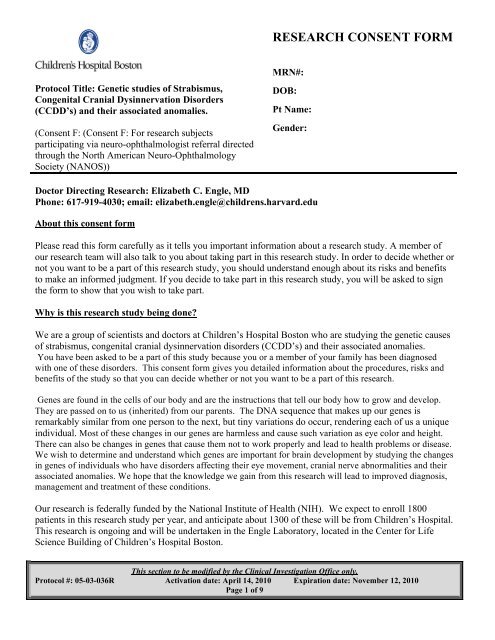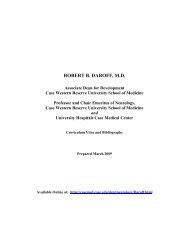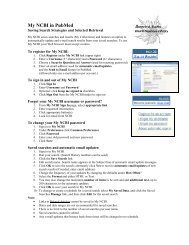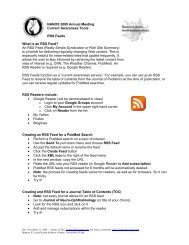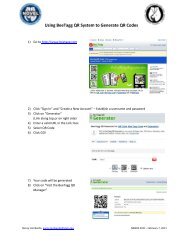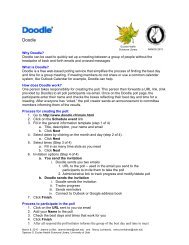RESEARCH CONSENT FORM - NOVEL
RESEARCH CONSENT FORM - NOVEL
RESEARCH CONSENT FORM - NOVEL
You also want an ePaper? Increase the reach of your titles
YUMPU automatically turns print PDFs into web optimized ePapers that Google loves.
<strong>RESEARCH</strong> <strong>CONSENT</strong> <strong>FORM</strong><br />
Protocol Title: Genetic studies of Strabismus,<br />
Congenital Cranial Dysinnervation Disorders<br />
(CCDD’s) and their associated anomalies.<br />
(Consent F: (Consent F: For research subjects<br />
participating via neuro-ophthalmologist referral directed<br />
through the North American Neuro-Ophthalmology<br />
Society (NANOS))<br />
MRN#:<br />
DOB:<br />
Pt Name:<br />
Gender:<br />
Doctor Directing Research: Elizabeth C. Engle, MD<br />
Phone: 617-919-4030; email: elizabeth.engle@childrens.harvard.edu<br />
About this consent form<br />
Please read this form carefully as it tells you important information about a research study. A member of<br />
our research team will also talk to you about taking part in this research study. In order to decide whether or<br />
not you want to be a part of this research study, you should understand enough about its risks and benefits<br />
to make an informed judgment. If you decide to take part in this research study, you will be asked to sign<br />
the form to show that you wish to take part.<br />
Why is this research study being done?<br />
We are a group of scientists and doctors at Children’s Hospital Boston who are studying the genetic causes<br />
of strabismus, congenital cranial dysinnervation disorders (CCDD’s) and their associated anomalies.<br />
You have been asked to be a part of this study because you or a member of your family has been diagnosed<br />
with one of these disorders. This consent form gives you detailed information about the procedures, risks and<br />
benefits of the study so that you can decide whether or not you want to be a part of this research.<br />
Genes are found in the cells of our body and are the instructions that tell our body how to grow and develop.<br />
They are passed on to us (inherited) from our parents. The DNA sequence that makes up our genes is<br />
remarkably similar from one person to the next, but tiny variations do occur, rendering each of us a unique<br />
individual. Most of these changes in our genes are harmless and cause such variation as eye color and height.<br />
There can also be changes in genes that cause them not to work properly and lead to health problems or disease.<br />
We wish to determine and understand which genes are important for brain development by studying the changes<br />
in genes of individuals who have disorders affecting their eye movement, cranial nerve abnormalities and their<br />
associated anomalies. We hope that the knowledge we gain from this research will lead to improved diagnosis,<br />
management and treatment of these conditions.<br />
Our research is federally funded by the National Institute of Health (NIH). We expect to enroll 1800<br />
patients in this research study per year, and anticipate about 1300 of these will be from Children’s Hospital.<br />
This research is ongoing and will be undertaken in the Engle Laboratory, located in the Center for Life<br />
Science Building of Children’s Hospital Boston.<br />
This section to be modified by the Clinical Investigation Office only.<br />
Protocol #: 05-03-036R Activation date: April 14, 2010 Expiration date: November 12, 2010<br />
Page 1 of 9
<strong>RESEARCH</strong> <strong>CONSENT</strong> <strong>FORM</strong><br />
Procedure:<br />
Medical and family history:<br />
You are being asked to participate in this study because you or a member of your family has strabismus, a<br />
CCDD or associated anomaly. We are asking you to participate whether you were born into this family or<br />
married a member of this family. If you choose to participate, you will be asked questions about yourself,<br />
your children, siblings, grandparents, and possibly other family members. These questions may include<br />
age, ethnic background, health status and the biological relationship between individuals. In addition, with<br />
your permission, we may review your medical records or contact your health care provider to gain further<br />
information about your strabismus, CCDD and associated medical conditions.<br />
Sample collection:<br />
You will be asked to give a sample of saliva or blood, from which we can study your genetic material<br />
(DNA). Providing a blood sample will involve our taking approximately 1 to 6 teaspoons of blood from a<br />
vein in your arm. If there are costs for your blood draw or transportation to the appointment to have your<br />
blood drawn for participation in this research, we will refund these costs to you if you give us the receipt(s)<br />
showing the exact cost and date of service.<br />
The sample donation will need to be performed only once unless the laboratory procedures fail, in which<br />
case a second sample may be requested. Alternatively, we may take a small swab of cells from your inner<br />
cheek, a sample of mouthwash that you have swished in your mouth, or some cut fingernails from which<br />
we can isolate a smaller amount of DNA. Finally, if you or your child is scheduled to undergo surgery for<br />
the eye movement disorder, we may ask your surgeon if any muscle tissue normally removed during the<br />
surgery is available for examination and study.<br />
Research use of samples:<br />
DNA obtained from your sample may be used to search, identify and study genes involved in strabismus,<br />
cranial nerve abnormalities and their associated anomalies. We may use techniques that study all of your genes,<br />
only some of your genes and/or parts of your genetic material that do not have a currently known purpose or<br />
function. We may undertake linkage analysis on your DNA and others to determine the genetic location<br />
where a gene associated with your disorder may lie. Once a region has been localized to a chromosomal<br />
location, it is possible to identifiy the causative gene by screening sequences within that region. If a change<br />
is identified, then sequencing a subset of the population for this gene will determine whether the change in<br />
the normal gene sequence is a polymorphism (non disease causing) or pathogenic (disease causing).<br />
Other techniques may include whole genome analysis in which all or most of your genetic code is studied and<br />
used to find the causes of your disorder, or the disorder in your family. In some cases we may use blood that<br />
has already been drawn to grow your blood cells in a dish. Blood cells grown in this manner can survive<br />
indefinitely, providing a greater source of genetic material. We may also use your blood to examine your<br />
chromosomes for abnormalities that may cause the eye movement disorder.<br />
This section to be modified by the Clinical Investigation Office only.<br />
Protocol #: 05-03-036R Activation date: April 14, 2010 Expiration date: November 12, 2010<br />
Page 2 of 9
<strong>RESEARCH</strong> <strong>CONSENT</strong> <strong>FORM</strong><br />
Confidentiality and storage of research information, samples and data:<br />
Information collected about you during this study will be given a unique code number and will not be put in<br />
your medical record. Your sample(s) and research data will be associated with your unique code only and stored<br />
without your name, medical record number or other identifying information. The information, samples and data<br />
will be accessible to the research study staff only and will be stored within the research laboratory in a secure<br />
and locked location and/or on a password-protected database at Children’s Hospital Boston. Only the research<br />
study staff will be able to identify which sample(s), information and data belong to you and this link to your<br />
identity will not be shared with anyone outside of the study.<br />
As part of this research we would like to store any remaining sample for future use. The remaining<br />
samples may be stored indefinitely and may be used for future studies on strabismus, congenital cranial<br />
dysinnervation disorders (CCDD’s) and their associated anomalies. The samples will remain in the<br />
possession of Dr. Engle or her successors here at Children’s Hospital Boston. If Dr. Engle chooses to share<br />
your samples with other investigators, your samples will be made anonymous and distributed without your<br />
name, medical record number, or other information linking the sample to you. Your identity will not be<br />
shared with outside researchers without explicit consent. If at any time you would like to have your sample<br />
removed from storage, please let us know and it will be transferred or destroyed according to your wishes.<br />
Results obtained prior to your sample removal will remain part of the study.<br />
In order to allow researchers to share results, the National Institutes of Health (NIH) and other organizations<br />
have developed special data/information banks that collect and analyze DNA samples and results of whole<br />
genome studies. If provided to them, these central banks would store your genetic information and sample(s)<br />
and give them to other researchers to do more studies. Your sample(s) and data would be sent with your unique<br />
code number only; no identifiable information about you would ever be given to central banks. We do not think<br />
there will be further risks to your privacy and confidentiality by sharing your samples and whole genome<br />
information with these banks. There are many safeguards in place to protect your information and sample(s)<br />
while they are stored in these banks and used for research.<br />
A copy of this consent form will NOT be placed in you/your child’s medical record.<br />
In addition, to provide you with additional protection we have a Certificate of Confidentiality (CC) from<br />
the US government. It adds special protection for research information that identifies you. It says we do<br />
not have to identify you, even under a court order or subpoena. The government may see your information<br />
if it audits us. This Certificate does not mean the government approves or disapproves of our project.<br />
You should understand that a Certificate of Confidentiality does not prevent you or a member of your<br />
family from voluntarily releasing information about yourself or your involvement in this research. If an<br />
insurer, employer, or other person obtains your written consent to receive research information, then the<br />
researchers may not use the Certificate to withhold that information.<br />
This section to be modified by the Clinical Investigation Office only.<br />
Protocol #: 05-03-036R Activation date: April 14, 2010 Expiration date: November 12, 2010<br />
Page 3 of 9
<strong>RESEARCH</strong> <strong>CONSENT</strong> <strong>FORM</strong><br />
The Certificate of Confidentiality does not prevent the researchers from disclosing voluntarily, without<br />
your consent, information that would identify you as a participant in the research project under the<br />
following circumstances: if the researchers are concerned that you may be suicidal (thinking about killing<br />
yourself) or otherwise at immediate risk for seriously harming yourself or others they will need to notify<br />
your primary care provider or counselor and/or involve your parents or guardian according to standard<br />
clinic practice or if, during your participation in this study, we learn about serious harm to you or someone<br />
else, such as child abuse, we will take steps to protect you or other people, including notifying the<br />
Department of Social Services or other authorities.<br />
Cost/time commitment:<br />
Your participation in the study should take no more than an hour. There is no fee for you to participate, as<br />
the costs associated with this study are covered by research funds. You will not be paid or otherwise<br />
compensated for your participation.<br />
Photographing and videotaping eye movements:<br />
If you agree, we will also photograph and/or video-record your eye movements. These recordings will be<br />
used to review your eye movements in the future. Also, with your permission, we may use these recordings<br />
in medical teaching and medical publications. These recordings will not be used except as described above,<br />
and will not be released to anyone else. Please indicate below whether you agree to this or not.<br />
□ Yes, I do<br />
□ No, I do not agree to have my eye movements photographed and/or videotaped.<br />
□ Yes, I do □ No, I do not give permission for these photographs and/or videotapes to be used in<br />
medical teachings, and/or publications.<br />
Recontact for additional data or participation in future studies:<br />
Over time we may wish to obtain updated information from participants. In addition, other studies may<br />
arise as a direct result of this study. Please indicate below whether we are permitted to contact you in the<br />
future:<br />
□ Yes, I do □ No, I do not wish to be contacted in the future in order to provide additional clinical<br />
information.<br />
□ Yes, I do □ No, I do not wish to be contacted if future studies arise.<br />
Risks and Discomforts:<br />
Risks associated with a blood draw are minor discomfort and bruising. When possible we will draw blood<br />
at the time of a clinically indicated procedure so that you will not need to have blood drawn only for<br />
research purposes. There is no risk associated with providing a saliva sample.<br />
There is a chance that participation in this study could cause psychological distress. Some people<br />
involved in genetic studies have felt anxious about the possibility of carrying an altered gene that<br />
This section to be modified by the Clinical Investigation Office only.<br />
Protocol #: 05-03-036R Activation date: April 14, 2010 Expiration date: November 12, 2010<br />
Page 4 of 9
<strong>RESEARCH</strong> <strong>CONSENT</strong> <strong>FORM</strong><br />
places them at risk or that may be passed on to children. If these feelings arise at any time during the<br />
study, you may contact us and we will arrange for you to speak with a genetic counselor.<br />
You should also be aware that there might be social and economic disadvantages, which can be associated<br />
with the gathering of genetic information. You should know that our testing might find an inherited<br />
defective gene, which puts you at risk for a genetic disorder in the future. Genetic information divulged to<br />
the wrong source, could affect you and your family (if an insurance company or employer acquired this<br />
genetic information) or socially. We will do our best to keep all information confidential and only with<br />
your permission would we make this information available to others. The results of the genetic tests<br />
performed for research purposes will not be placed in your medical record. In this manner it will be<br />
unlikely that an insurance company or employer would ever learn of such results. You should be aware that<br />
we may detect instances of non-paternity (the discovery through the analysis of genetic testing that the<br />
father is someone other than who he was thought to be), and such information may interfere with our<br />
analysis. This non-paternity information will be kept in the strictest confidence and will not be divulged to<br />
anyone.<br />
Potential Benefits:<br />
You and your family may not directly benefit by participating in this research, however we hope that in the<br />
future information obtained from this study will help us understand the genetic causes of strabismus,<br />
CCDD’s and associated anomalies. This may eventually lead to new forms of treatment and diagnosis. An<br />
annual newsletter will be mailed to you and will include general information about grouped results<br />
although no individual information will be reported in the newsletter.<br />
Research result possibilities and reporting:<br />
This research study is meant to find genes that are important for strabismus and cranial nerve development,<br />
although we cannot study all possible diseases and genes. During the course of this research, we might find the<br />
gene(s) or a common variant that causes, or is associated with the strabismus, CCDD or associated anomaly in<br />
you/your child. Although we do not intend to, we might also find a gene that causes a different disorder or<br />
uncovers a risk of developing a disorder or disease in the future that is unrelated to the reason for your/your<br />
child’s participation in this study.<br />
You have the option of knowing if our study finds a genetic change in the sample collected from you/your child<br />
that, based on current scientific data and knowledge, could be (1) the cause of the disorder in you/your child or<br />
(2) the cause of another disorder or disease that could significantly affect your/your child’s health or medical<br />
care. The latter (#2) would only include results that are proven to have a known significant effect on human<br />
health. You also have the option of not learning any results from this research.<br />
Results from research genetic testing may take months or years to complete. It is possible that there will be no<br />
results from the research on your/your child’s sample. If you wish to inquire into the progress of this research,<br />
you are welcome to do so at any time.<br />
This section to be modified by the Clinical Investigation Office only.<br />
Protocol #: 05-03-036R Activation date: April 14, 2010 Expiration date: November 12, 2010<br />
Page 5 of 9
<strong>RESEARCH</strong> <strong>CONSENT</strong> <strong>FORM</strong><br />
Since our research laboratory is not certified for reporting results to patients, we cannot give you results from<br />
our research genetic testing. However, if we find a result as described above, we may be able to have these<br />
results confirmed by a CLIA-certified clinical laboratory. A CLIA lab is a lab that is authorized to release<br />
results from patient tests for clinical and diagnostic purposes. Result confirmation by a CLIA lab would involve<br />
the participation of your/your child’s health care provider(s) and obtaining a new blood or saliva sample from<br />
you/your child. The result would be given to your health care provider and then to you with appropriate medical<br />
and genetic counseling. Your result could then be used for clinical and diagnostic purposes and could become<br />
part of your/your child’s medical record. Testing in a CLIA lab could involve costs not covered by medical<br />
insurance.<br />
Please read the statements below and check next to the one that states your current wishes about results<br />
from this research study.<br />
1. I do not want to learn about results found out about me/my child. Please do not contact me.<br />
OR<br />
2. I want to learn only about results found about me/my child that could explain the condition<br />
that was the reason for my/my child’s research participation (strabismus, CCDD or associated<br />
anomaly).<br />
OR<br />
3. I want to learn about results found about me/my child, including results that could (1) explain<br />
my/my child’s condition (strabismus, CCDD or associate anomaly) and/or (2) be the cause of another<br />
disorder or disease that could significantly affect my/my child’s health or medical care but is unrelated to<br />
the reason for my/my child’s research participation.<br />
You can change your mind about whether or not to receive results from this research at any time by contacting<br />
the Study Contacts listed below. The Study Contacts are also available to discuss your options further at your<br />
request.<br />
Alternatives:<br />
Participation in the research is completely voluntary. You should not feel any pressure to participate. If you<br />
do not want to participate it will not interfere with any future care you or your family receives at this<br />
institution.<br />
Research at Children’s Hospital<br />
Children’s Hospital has recently developed a web-based, interactive educational program for parents called<br />
“A Parent’s Guide to Medical Research.” To find out more about research at Children’s Hospital, please<br />
visit the program at www.researchchildren.org<br />
This section to be modified by the Clinical Investigation Office only.<br />
Protocol #: 05-03-036R Activation date: April 14, 2010 Expiration date: November 12, 2010<br />
Page 6 of 9
<strong>RESEARCH</strong> <strong>CONSENT</strong> <strong>FORM</strong><br />
Children's Hospital is interested in hearing your comments, answering your questions and responding to<br />
any concerns regarding clinical research at Children's hospital. If you would like further information about<br />
the type of clinical research performed at the hospital or have suggestions, questions or concerns regarding<br />
clinical research you may send an email to cci@childrens.harvard.edu or call 617 355-7052 between the<br />
hours of 8:30 am and 5:00 pm.<br />
What information do I need to know about the Health Insurance Portability and Accountability<br />
Act (HIPAA)?<br />
During this research, information about your or your child’s health will be collected. In general, under<br />
federal law, information about patients is private, but there are exceptions and you should know who will<br />
have access to this information and might see it.<br />
Researchers may be collecting information about you or your child from medical records. They may also<br />
learn things from procedures that are part of the research itself such as tests, office visits, questionnaires<br />
and interviews.<br />
The following people will be able to see this information:<br />
• Medical and research staff at Children’s Hospital, including people listed on your informed consent.<br />
• Medical staff who are directly involved in your care that is related to the research or arise from it.<br />
• People who oversee, advise or conduct research at Children’s Hospital, and people who oversee or evaluate<br />
research and care, including the Committee on Clinical Investigation, staff working on quality improvement,<br />
and other clinicians and administrative staff of Children's Hospital.<br />
• People from agencies and organizations that provide independent accreditation and oversight of research<br />
• Sponsors or others involved in funding the research<br />
• Federal agencies that oversee or review research information.<br />
• Government agencies and sponsors.<br />
• If some law or court requires us to share the information, we would have to follow that law or final ruling<br />
You/your child should be aware that the federal privacy rule does not cover all of these possible uses. This means<br />
that once some of the above mentioned users receive your/your child’s health information they do not have to follow<br />
the same rules. Other laws may or may not protect sharing of private health information. If you have a question about<br />
this you may contact the Children’s Hospital Privacy Officer at 617-355-5502.<br />
There is no set time for destroying this information and no time limit for its use. Researchers continue to analyze<br />
date for many years and it is not possible to know when they will be done.<br />
You or your child do not have to sign this form. If the form is not signed, however, you won’t be able to participate<br />
in the study. Not signing will not affect your care or your child’s care at Children’s Hospital in any way now or in<br />
the future. Also, there will be no penalty or loss of benefits if you choose not to sign and participate.<br />
You or your child also have the right to withdraw from this study at any time. You have the right to end your<br />
permission for Children’s Hospital to use or share the protected information about you or your child that was<br />
collected as part of the research.<br />
This section to be modified by the Clinical Investigation Office only.<br />
Protocol #: 05-03-036R Activation date: April 14, 2010 Expiration date: November 12, 2010<br />
Page 7 of 9
<strong>RESEARCH</strong> <strong>CONSENT</strong> <strong>FORM</strong><br />
Researchers may also continue to use information already collected to protect the integrity of the study. This means<br />
that your withdrawal won’t make the whole study useless. Once you remove your permission and you or your child is<br />
no longer in the study, no more private health information will be collected. If you wish to withdraw you will need to<br />
do so in writing. Your investigator will have a form for you to use. If you or your child decide to share private<br />
information with anyone not involved in the study, the federal law designed to protect privacy may no longer apply<br />
to this information.<br />
Although there are some legal limitations, you or your child have the right to get protected information resulting<br />
from this research that relates to your treatment or to payments. This information is available after the study analysis<br />
is done. To request the information, please contact the Hospital’s Privacy Officer at 617-355-5502. If you have<br />
questions, please be sure to ask for answers.<br />
Research at Children’s Hospital: Children’s Hospital has recently developed a web-based, interactive<br />
educational program for parents called “A Parent’s Guide to Medical Research.” To find out more about<br />
research at Children’s Hospital, please visit the program at www.researchchildren.org<br />
Children's Hospital is interested in hearing your comments, answering your questions and responding to<br />
any concerns regarding clinical research at Children's Hospital. If you would like further information about<br />
the type of clinical research performed at the hospital or have suggestions, questions or concerns regarding<br />
clinical research you may send an email to cci@childrens.harvard.edu or call 617 355-7052 between the<br />
hours of 8:30 and 5:00.<br />
INVESTIGATOR’S AND/OR ASSOCIATE’S STATEMENT:<br />
I have fully explained to all involved parties (participant/parent/guardian as applicable) the nature and<br />
purpose of the above-described procedures and the risks involved in its performance. I have provided the<br />
subject/family with the Privacy Rule if requested. I have answered and will answer all questions to the best<br />
of my ability. I will inform the participant of any changes in the procedures or the risks and benefits if any<br />
should occur during or after the course of the study. I have given a copy of the consent/ authorization form<br />
to the subject/family.<br />
<br />
_______________________________________________________________<br />
Date (MM/DD/YEAR) Signature of Investigator or Associate<br />
<strong>CONSENT</strong>/AUTHORIZATION:<br />
*If the child to be involved in this research study is a foster child or a ward of the state please notify<br />
the researcher or their staff who is obtaining your consent.<br />
I understand that I may use the following contact information to reach the appropriate person/office to address any<br />
questions or concerns I may have about this study. I know:<br />
This section to be modified by the Clinical Investigation Office only.<br />
Protocol #: 05-03-036R Activation date: April 14, 2010 Expiration date: November 12, 2010<br />
Page 8 of 9
<strong>RESEARCH</strong> <strong>CONSENT</strong> <strong>FORM</strong><br />
I can call … At … If I have questions or concerns about …<br />
Investigator: Dr. Engle Phone: 617-919-4030 General questions about the study.<br />
Pager: 617-355-7243 # 1992 Research-related injuries or emergencies.<br />
Any research-related concerns or complaints.<br />
Study Contact: Caroline Andrews Phone: 617-919-2168 General questions about the study.<br />
Research-related injuries or emergencies.<br />
Any research-related concerns or complaints.<br />
Office of Clinical Investigations Phone: 617-355-7052 Rights of a research subject.<br />
Use of protected health information.<br />
Compensation in event of research-related injury<br />
Any research-related concerns or complaints.<br />
If investigator/study contact cannot be reached.<br />
If I want to speak with someone other than the<br />
Investigator, Study Contact or research staff.<br />
I have been satisfactorily informed of the above-described procedure with its possible risks and benefits. I have been<br />
provided with the applicable Privacy Rule provisions under the Health Insurance Portability and Accountability Act.<br />
I give permission for my/my child's participation in this study and for use of the associated protected health<br />
information as described above.<br />
I understand that participation in this study is voluntary. If I refuse to participate or choose to drop out of the study at<br />
any time, I understand there will be no penalty or loss of benefits to which I am otherwise entitled, and this decision<br />
will not affect present or future care by the doctors or the hospital. I am signing this consent form before participating<br />
in any research activities. I have been given a copy of this form.<br />
__________________ _______________________________________________ _________________<br />
Date (MM/DD/YEAR) If subject less than 18yrs: Signature of Parent or Guardian Relationship to child<br />
or,<br />
If subject 18yrs or older: Signature of Adult Participant<br />
__________________<br />
Date (MM/DD/YEAR)<br />
_____________________________________________<br />
Signature of Child/Adolescent Participant<br />
If child/adolescent’s assent not obtained above, please specify why (e.g. too young, subject sedated):<br />
____________________________________________________________<br />
WITNESS SIGNATURE REQUIRED BELOW ONLY IF: (check which one applies)<br />
the consent document needs to be read to subject or legal representative or<br />
communication impairments limit the subject’s ability to clearly express consent or<br />
required by sponsor/CCI.<br />
other reason: please specify _____________________________________________<br />
I confirm that the information in this consent form was accurately explained to, and understood by the subject or<br />
legally authorized representative, and that informed consent was given freely.<br />
__________________<br />
Date (MM/DD/YEAR)<br />
______________________________________<br />
Signature of Witness<br />
This section to be modified by the Clinical Investigation Office only.<br />
Protocol #: 05-03-036R Activation date: April 14, 2010 Expiration date: November 12, 2010<br />
Page 9 of 9


